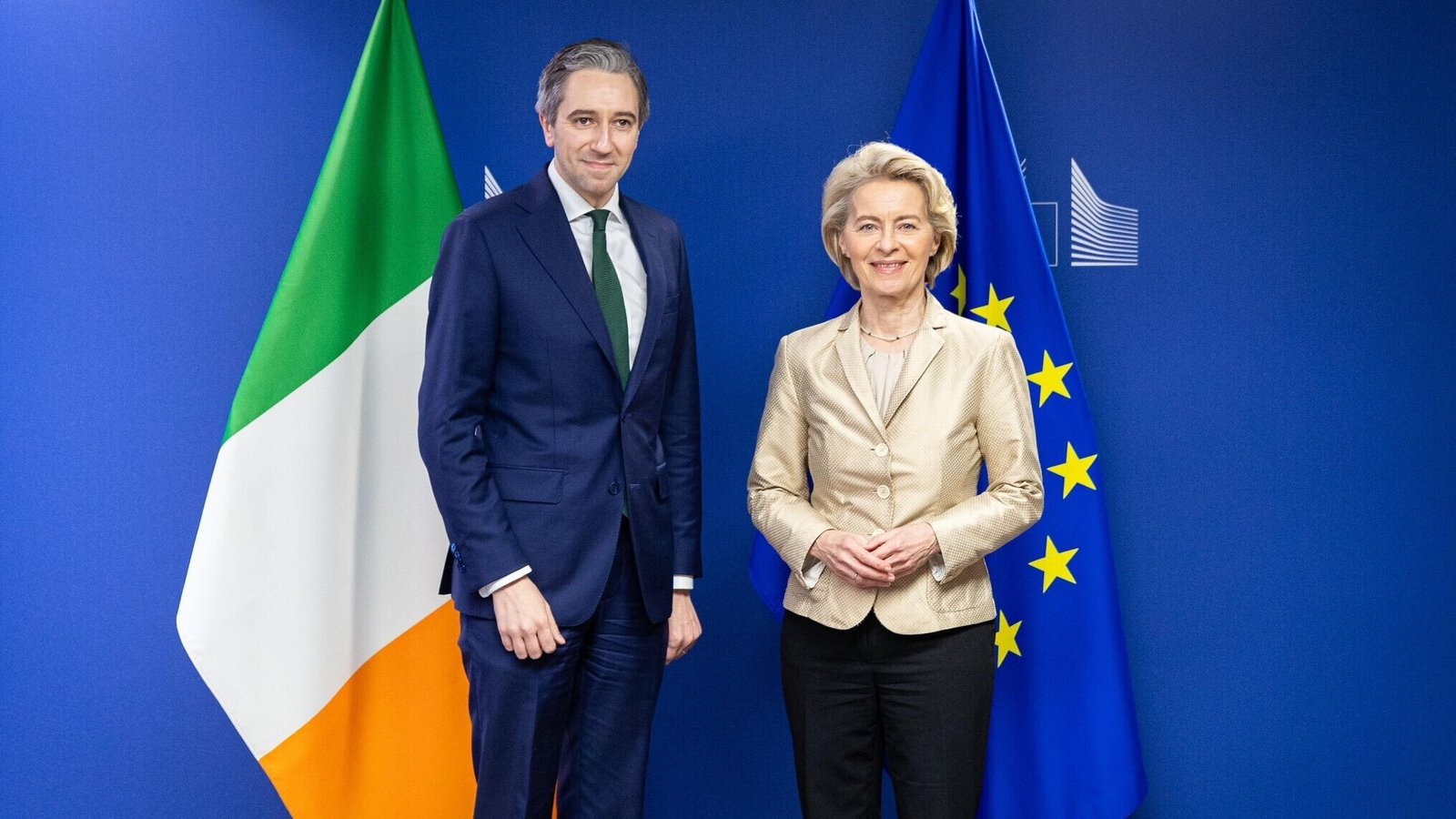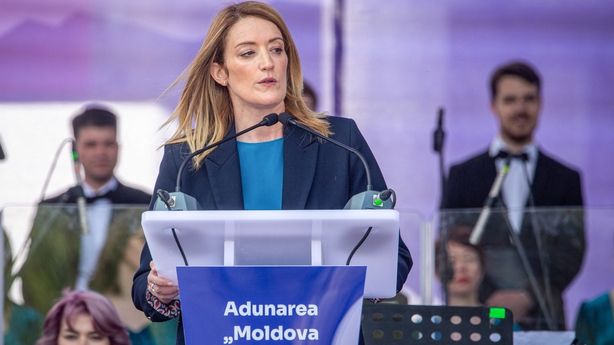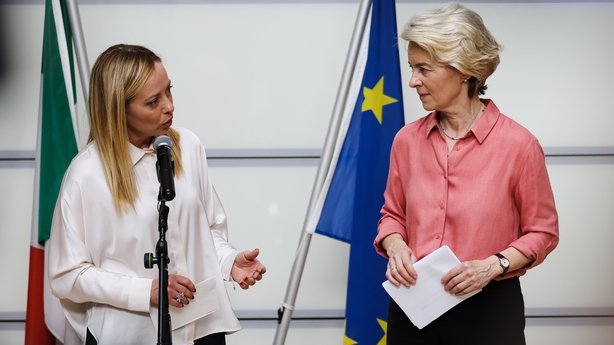Taoiseach in Brussels as top EU jobs up for discussion

Taoiseach Simon Harris will travel to Brussels for an informal meeting of EU leaders on how to distribute the bloc’s top jobs, with Ursula von der Leyen seemingly on track for a second term as President the European Commission.
Far-right gains in EU-wide elections, which triggered snap polls and political upheaval in France, appear to have focused minds around the positions at the bloc’s helm – negotiated among its members with an eye to geographic and political balance.
While leaders were expected to formally make their choices known at a 27-28 June summit, a consensus already appears to be emerging.
“I believe things can move forward efficiently. At least that is my wish, and that will be my frame of mind on Monday,” French President Emmanuel Macron said at the end of the G7 summit in Italy, where he held talks with both German Chancellor Olaf Scholz and Ms von der Leyen.
Mr Scholz sent a similar message, telling ARD television that “a political majority is coming together” and that “things could be decided fast”.
The Taoiseach, citing Russia’s invasion of Ukraine, Israel’s ongoing war in Gaza and climate change, said the people of Europe need and deserve stability and direction.
He added that it is imperative that the European Council completes all appointments to the EU institutions as quickly as possible.
The meeting kicks off at 6pm (5pm Irish time) in Ms von der Leyen’s presence – but the commission chief will leave before dinner, when leaders are to tackle the matter of top jobs.
The meeting will not decide Ms Von der Leyen’s political fate, but it should provide a clear indication as to how solid her chances are.
Ms von der Leyen’s European People’s Party (EPP) was the biggest winner from the recent EU parliament elections, cementing the German conservative’s bid for five more years helming the executive body of the world’s second-largest economy.
The expectation is that EU leaders will ultimately support Ms von der Leyen and her name will be proposed to the European Parliament for approval.
Fine Gael to back von der Leyen – McGuinness
Speaking on RTÉ’s This Week programme yesterday, Ireland’s EU Commissioner Mairead McGuinness declared that Ms von der Leyen is guaranteed the four Fine Gael votes but not the other ten MEPs’ votes.
In the European Parliament in 2019, Ms von der Leyen secured the top job at the European Commission by just nine votes.
Some MEPs who backed her then, like Fianna Fáil’s Billy Kelleher, say they will not support her this time due to her visit to Tel Aviv in the aftermath of the 7 October attack by Hamas, alongside giving the Israeli government unqualified support.
The other roles to be decided are: president of the European Council, which represents member states and is currently filled by Charles Michel; and the “high representative” – the EU’s foreign policy chief- currently Josep Borrell.

The second group in parliament, the Socialists and Democrats (S&D), have their sights set on the council position – with Antonio Costa, Portugal’s 62-year-old former prime minister, seen as frontrunner.
Mr Costa resigned after becoming embroiled in a corruption probe – but the case has since appeared to come apart, and diplomats suggest it is unlikely to stand in his way.
The high representative position could go to Kaja Kallas, 46, current premier of Estonia and an outspoken critic of Russia – in a strong signal to the EU’s east.
A fourth job is in play: that of European Parliament president, decided by the legislature, not the leaders. It is likely to return the incumbent, the EPP’s Roberta Metsola, 45, for another two-and-a-half-year term.
Political hurdle
To secure the nod from EU leaders, Ms von der Leyen needs support from a “qualified majority” of 15 out of 27 countries, covering at least 65% of the bloc’s population.
A dozen leaders come from her EPP political grouping – but she also needs to win over Mr Macron, from the centrist Renew Europe group, and Mr Scholz of the S&D.
Both leaders of the Franco-German axis at the heart of the European Union have emerged weakened after being beaten by far-right parties in this month’s polls.
Conversely, the elections strengthened the hand of Italy’s prime minister, Giorgia Meloni, who diplomats suggest may want to let the dust settle in the new EU parliament – where her far-right party’s grouping gained seats and may yet gain more – and negotiate accordingly.
If, as expected, Ms von der Leyen ultimately pockets enough leaders’ votes, she can set about choosing her commissioners – drawn from each of the EU member countries with consideration for gender balance and political affiliation.

But she will have one more hurdle to pass.
The new European Parliament has to approve leaders’ picks and proposed commissioners.
Most politicians from the EPP, which holds 190 seats in the incoming 720-seat parliament, will endorse Ms von der Leyen – but she will need support from elsewhere to secure a majority.
That would likely come from the other mainstream political families, the S&D and Renew, or from the Greens – but Ms von der Leyen has also been covering her bases by courting Ms Meloni, on the hard right.
Additional reporting AFP
Related
ForexLive European FX news wrap: Euro stays buoyed, markets wait…
Headlines:Markets:EUR leads, AUD lags on the dayEuropean equities lower; S&P 500 futures up 0.1%US 10-year yields down 2.7 bps to 4.255%Gold up 0.4% to $2,9
European shares fall as tariff uncertainties weigh; US jobs data…
(Reuters) - European shares fell on Friday as frequent shifts in U.S. trade policy throughout the week resulted in risk aversion, while focus remained on th
US economy added 151,000 new jobs in February; Euro on…
US jobs report releasedNEWSFLASH: Hiring across the US economy picked up slightly at the start of Donald Trump’s second term in office.The US economy added 15












